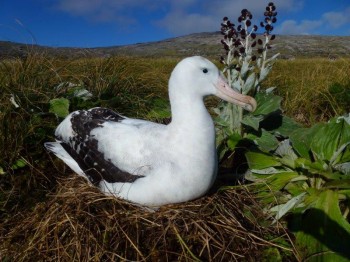José Xavier (Department of Life Sciences, Institute of Marine Research, University of Coimbra, Portugal) and colleagues have published in the journal Marine Ecology Progress Series on cephalopods consumed by two different populations of Antipodean Albatrosses Diomedea antipodensis.
The paper’s “pre-press abstract” follows:
“Cephalopods play an important ecological role in the Southern Ocean, being the main prey group of numerous top predators. However, their basic ecology and biogeography is still poorly known, particularly in the lightly sampled Pacific sector of the Southern Ocean. We collected and analyzed information on cephalopods in that area, using Antipodean and Gibson´s wandering albatrosses breeding at Antipodes Islands and Auckland Islands, respectively in the New Zealand sub-Antarctic islands as samplers, as they are known from tracking studies to cover huge areas of the Pacific sector of the Southern Ocean (Antipodean wandering albatrosses mostly forage east of New Zealand whereas Gibson´s wandering albatrosses forage west of New Zealand). A total of 9111 cephalopod beaks, from 41 cephalopod taxa, were identified from boluses (voluntarily regurgitated items by chicks). The families Histioteuthidae (e.g. Histioteuthis atlantica) and Onychoteuthidae (e.g. Moroteuthis robsoni) were the most important cephalopods numerically and by reconstructed mass, respectively, in both wandering albatross species. Combining this information with previously gathered data on cephalopods in the Atlantic and Indian sectors of the Southern Ocean, we provide evidence from predators of the circumpolar distribution of numerous key cephalopod species have in the Southern Ocean, and provide new information on poorly known cephalopods (i.e. relevance in the diet of wandering albatrosses, sizes consumed, biodiversity in the South Pacific, assemblages according to predator breeding sites) in one of the most remote ocean areas in the planet.”

Antipodean Albatross, photograph by Colin O'Donnell
Reference:
Xavier, J.C., Walker, K., Elliot, G., Cherel, Y. & Thompson, D. 2014. Cephalopod fauna of South Pacific waters: new information from breeding New Zealand wandering albatrosses. Marine Ecology Progress Series doi: 10.3354/meps10957.
John Cooper, ACAP Information Officer, 01 September 2014

 English
English  Français
Français  Español
Español